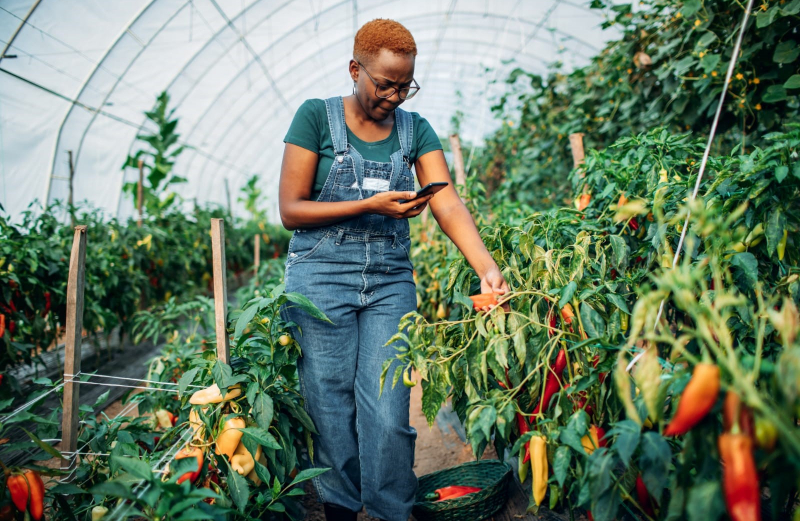Smart Agriculture through Mobile Technologies in Africa

It is estimated that approximately 94% of farms in developing countries utilise mobile phones[1]. Mobile digital devices such as mobile computers and smartphones, digital cameras, pagers, personal navigation device, and wearable computers have allowed Africa’s farmers to access and share information with different stakeholders. These mobile digital devices can be connected to remote sensing data devices that alert farmers well in advance on forthcoming climate and weather conditions such as droughts and floods. In additions, mobile digital technologies have also enabled farmers obtain crucial information on soil quality with respect to nutrients levels, water levels, pests and disease spread, among others, captured from various sensors, satellites, and drones. On the other hand, mobile technology, propelled by the realities of the COVID-19 pandemic lockdowns and the transition towards technology transformation in the 4th Industrial Revolution, has enabled previously disadvantaged Africa’s farmers connect with agri-food services and products that were historically inaccessible. As a result, the rapid adaptation and adoption of smartphones across the African continent have enabled smallholder farmers to access public sector services offered by African governments and private sectors services such as digital financial services offered by banking and other financial institutions.
Harnessing the growth of mobile digital technologies can significantly help farmers access crucial information and data required to address specific farming management systems and underlying constraints. Therefore, there is a need for African farmers to transition from the traditional farming management methods into modern and digital agricultural technological management processes, combined with knowledge-based advisory services. Notably, adopting such technologies can facilitate transformative agricultural development through collaborative agricultural knowledge exchange and learning. Furthermore, it has been reported that[2] low agricultural productivity results from inefficient agricultural management systems and this negatively impacts Africa’s food security and productivity. Notably, this is characteristic of the limited adoption of existing and emerging modern digital technologies within Africa’s agricultural sector.
Throughout the COVID-19 pandemic lockdowns, Africa’s farmers have continually accessed digital services through their mobile smartphones. This includes financial services, product services, agri-food products’ logistical tracking, and real-time prices of their products at local markets. Consequently, the up-to-date tracking of their agricultural commodities (dairy, grains, livestock) has enabled well managed and sustainability sales by farmers. Moreover, such robust logistical management systems enable better pricing of agri-food products by farmers. Furthermore, such well-documented data provides decision-makers, policymakers, financial and regulatory institutions, and trading bodies with reliable information on price variations. Consequently, digital technology services effectively prevent price volatility and speculation that negatively impacts low-income households. In addition, farmers have also accessed weather and geographical data, crop pests/diseases and mitigation strategies, and length of the growing seasons through mobile digital devices.[3] Most importantly, mobile smartphones are enabling African farmers to access trading opportunities through various intra-country trade platforms such as the African Continental Free Trade Area and access to reliable agri-food product transportation services. This is because mobile digital technologies are improving product traceability with critical information on transportation and storage.
The African continent has accomplished tremendous progress with respect to the utilization of mobile smartphones towards improving agricultural productivity. However, there remains several fundamental challenges that include inadequate mobile smartphone infrastructure, thus, limiting numerous African farmers’ widespread utilization of mobile digital applications for agri-food purposes. For instance, numerous parts of the African continent have limited cellphone network and internet coverage. In addition, reliable broadband remains limited in rural areas where most of the agricultural activities occur. Thus, African governments and network service providers are encouraged to target rural areas, more especially agricultural areas, in order to improve the profitability of Africa’s agricultural activities. Moreover, this can also improve regulatory frameworks that can focus on enabling infrastructural improvements, broadband cost-effectiveness, operational reliability, and access to internet services.
Limited technical and operational knowledge and literacy within most African farmers remain one of the significant hindrances towards the adoption of mobile agricultural digital technologies. Therefore, African governments are encouraged to formulate digital technology literacy programmes and applications targeting farmers, more especially farmers lacking basic education. Such efforts can improve digital technology literacy on farmers; thereby, improving productivity and food security within the continent. Moreover, interventions on cost-effectiveness on internet and data costs need to be urgently addressed to improve access to previously disadvantaged farmers. Most importantly, decision-makers and policymakers are encouraged to support rural communities towards adopting modern digital technologies suitable for precision agriculture.
In conclusion, for Africa to achieve the aspirations pertaining to Agenda 2063’s Comprehensive Africa Agriculture Development Programme, United Nations’ Sustainable Development Goals, and the Food and Agricultural Strategic Frameworks, there is a need for African farmers to adopt better digital technologies that will improve agri-food operational and business management systems. Interestingly, it has been demonstrated that adopting mobile digital technologies in Africa significantly improved agricultural productivity from 32% up to 44% between 2012 and 2018.[4] Furthermore, it has been projected that such improvements will reach 50% by 2025. Therefore, such improvements emanating from the adoption of digital technologies can encourage African farmers, private sector, and governments to seek more digital technology applications that can boost precision agriculture. Finally, access to emerging markets using mobile digital technologies can deliver a significant contribution to food security, improve efficiency, and reduce negative environmental impacts due to farming.
Authors: APET Secretariat
Featured Bloggers:
Justina Dugbazah
Lukovi Seke
Barbara Glover
Bhekani Mbuli
Chifundo Kungade
[1] Smart Agriculture on Smartphones https://blog.agrivi.com/post/smart-agriculture-on-smartphones
[2] Henze, J. and C. Ulrichs (2016). The Potential and Limitations of Mobile-learning and other services in the Agriculture Sector of Kenya Using Phone Application. Berlin: Humboldt-Universitat zu. (Conference paper: 12th European International Farming Systems Association (IFSA) Symposium, Social and technological transformation of farming systems: Diverging and converging pathways, 12-15 July 2016, Harper Adams University, Newport, Shropshire, UK 2016 pp.1-11 ref.32) ; https://www.harper-adams.ac.uk/events/ifsa/papers/2/2.5%20Henze.pdf
[3] Jessee, U. and A. Moorthy. How mobile technology is improving agriculture in Africa, Global Impact Articles Series, Dow Sustainability Fellows, University of Michigan. http://sustainability.umich.edu/media/files/dow/MobileTech.AfricanAgriculture.pdf
[4] Statista, Sub-Saharan Africa: mobile penetration 2012-2025. https://www.statista.com/statistics/1133365/mobile-penetration-sub-saharan-africa/

